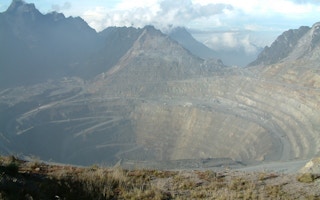A BuzzFeed News investigation has shined new light on the extent to which a secretive international legal system has enabled global mining companies to muscle their way into Indonesia’s last remaining rainforests.
A former Newcrest Mining executive told BuzzFeed News he had threatened to use the system, known as investor-state dispute settlement (ISDS), to sue Indonesia over a 1999 environmental law banning open-pit mining in protected forests. Prior to the legislation’s passage, the Australian company had won the right to explore for gold on a heavily forested island in the Malukus, an east Indonesian archipelago. But Newcrest had obtained the license during the 32-year rule of strongman President Suharto, who was finally driven from power in 1998.
Newcrest was one of 13 miners to be granted an exemption from the prohibition, in 2004, allowing them to open vast pits in some of the Southeast Asian country’s most pristine ecosystems. Soetisna Prawira, the mining ministry’s chief lawyer at the time, told Buzzfeed News that the threat of “arbitration is the only reason” the government caved in to the companies’ demands.
“
ISDS has morphed from a rarely used last resort, designed for egregious cases of state theft or blatant discrimination, into a powerful tool that corporations brandish ever more frequently, often against broad public policies that they claim crimp profits.
Chris Hamby, BuzzFeed News
ISDS is an instrument of international law that empowers foreign companies to sue host states in secretive arbitral tribunals presided over by corporate lawyers. The system is written into thousands of trade and investment treaties, including the Trans-Pacific Partnership now being pushed by the administration of U.S. President Barack Obama.
Introduced in the years following World War II, ISDS was originally intended as a means to protect foreign companies from having their assets seized by a rogue regime or from being discriminated against in favor of a domestic firm. “But over the last two decades,” BuzzFeed News reporter Chris Hamby wrote in the four-part series, “ISDS has morphed from a rarely used last resort, designed for egregious cases of state theft or blatant discrimination, into a powerful tool that corporations brandish ever more frequently, often against broad public policies that they claim crimp profits.”
Had Newcrest sued Indonesia over the 1999 Forestry Law, it likely would have sought hundreds of millions of dollars from the newly democratised country. Former Indonesian environment minister M.S. Kaban told BuzzFeed News that other companies had made similar threats, which influenced the government’s decision making. Officials had done the math and calculated that if other miners also sued, the state stood to lose up to $22.7 billion, about half of its entire 2003 budget.
Indonesia had already lost a case against a U.S.-owned geothermal company, Karaha Bodas, whose project in the archipelagic country was put on hold following the 1997 Asian financial crisis. An arbitral tribunal awarded the firm $261 million, mainly over the loss of potential future profits.
This story was published with permission from Mongabay. Read the full story.

















